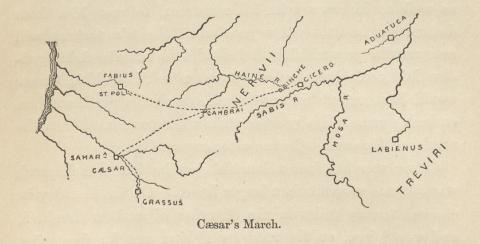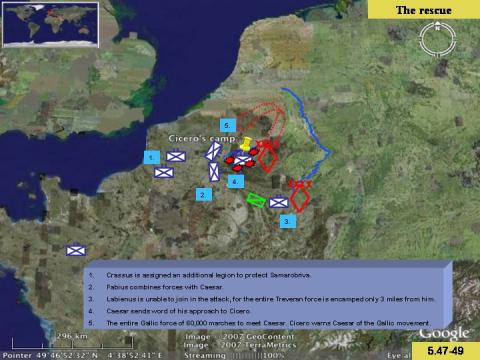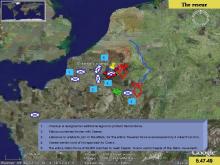Hōrā circiter tertiā ab antecursōribus dē Crassī adventū certior factus, eō diē mīlia passuum XX prōcēdit. Crassum Samarobrīvae praeficit legiōnemque eī attribuit, quod ibi impedīmenta exercitūs, obsidēs cīvitātum, litterās pūblicās, frūmentumque omne quod eō tolerandae hiemis causā dēvēxerat relinquēbat. Fabius, ut imperātum erat, nōn ita multum morātus in itinere cum legiōne occurrit. Labiēnus, interitū Sabīnī et caede cohortium cōgnitā, cum omnēs ad eum Trēverōrum cōpiae vēnissent veritus nē, sī ex hībernīs fugae similem profectiōnem fēcisset, hostium impetum sustinēre nōn posset, praesertim quōs recentī vīctōriā efferrī scīret, litterās Caesarī remittit: quantō cum perīculō legiōnem ex hībernīs ēductūrus esset; rem gestam in Ebūrōnibus perscrībit; docet omnēs equitātūs peditātūsque cōpiās Trēverōrum tria mīlia passuum longē ab suīs castrīs cōnsēdisse.
notes
vocabulary
circǐter: (Adv.) about, approximately
antěcursor, -ōris m.: advanced guards; forerunners
adventus, -ūs m.: arrival, a coming
passus, -ūs m.: step, pace
praefǐcǐo, -fǐcere, -fēci, fectum: to place in authority over
attrĭbŭo, -ĕre, -ŭi, -ūtum: allot, assign, put in charge of
tŏlĕro, -āre: endure; hold out, sustain
dēvĕho, -ĕre, -xi, -ctum: transport
intĕrĭtus, -ūs m.: destruction, ruin, annihilation
hībernus, -a, -um: referring to winter; hīberna, -ōrum n.: winter quarters
prǒfectǐo, -ōnis f.: a going away, departure
praesertim: especially, chiefly, principally
effěro, -ferre, extǔli, ēlātum: to bring or carry out; to lift up, raise; to inspire, elate
rěmitto, -mittěre, -mīsi, -missum: to let go back, drive back
perscrībo, -ěre, -psi, -ptum: to write in full, to write out
ěquǐtātus, -ūs m.: cavalry
pědǐtātus, -ūs m.: foot soldiers, infantry
consido, -ere, -sēdi, -sessum: take position



